

A great project is underway: to create the virtual worlds that will define the next version of the internet, the idea that has entered pop-culture as The Metaverse. What will the goal of these worlds be?
Following the development of tech over the last decade, you can see what works best for growth is not always the same as what is valuable to customers. The obvious and profitable approach to scaling a successful metaverse is to make it addicting, time consuming, compulsive, viral. There are already all kinds of games and platforms that are maximizing on these negative values, and one can imagine their effects magnifying a thousand-fold in something as all-encompassing as a metaverse.
So what should the goal of these gaming worlds be? An answer that I believe is better: beneficial, both to the Citizens of those worlds, and also to the communities, the creators that build for it, the streamers who engage audiences with it, and everyone else contributing to make it a positive experience. The value and meaning of a virtual world depends on its Citizens, not just the company building the platform, and that value should be shared with them, monetarily and otherwise.
Let’s put that into specifics. What will players do in worlds where they are Citizens, creating and sharing meaningful value? And how is that different from the current metaverse direction? The way we approach building our virtual worlds is with a focus on these core principles:
Taken together, these principles intermix and overlap in emergent ways that can form a world of depth and meaning which adds real value to the lives of its Citizens. Let’s explore them in detail.
While a gaming world is virtual, the systems that govern it can model real phenomena in incredible depth. Simulations of ecosystems, governments, economics, physics, and many other fields can serve as strong foundations for a virtual world. When a Citizen’s goals require successful navigation of these simulations, the success conditions of a game can match success conditions in reality. For example, in Eco’s ecosystem model, keeping the environment thriving requires understanding human impacts: how CO2 affects the climate, how economic actions create CO2, how biomes are affected by a changing climate, and how to minimize or reverse that impact. Even though you’re applying them in an artificial world, the skills you learn are real, the science and models are based on reality, and the social interactions as you argue your point of view (based on the simulation’s data) are critical. It requires skills and strategy that Citizens take with them outside of the game.
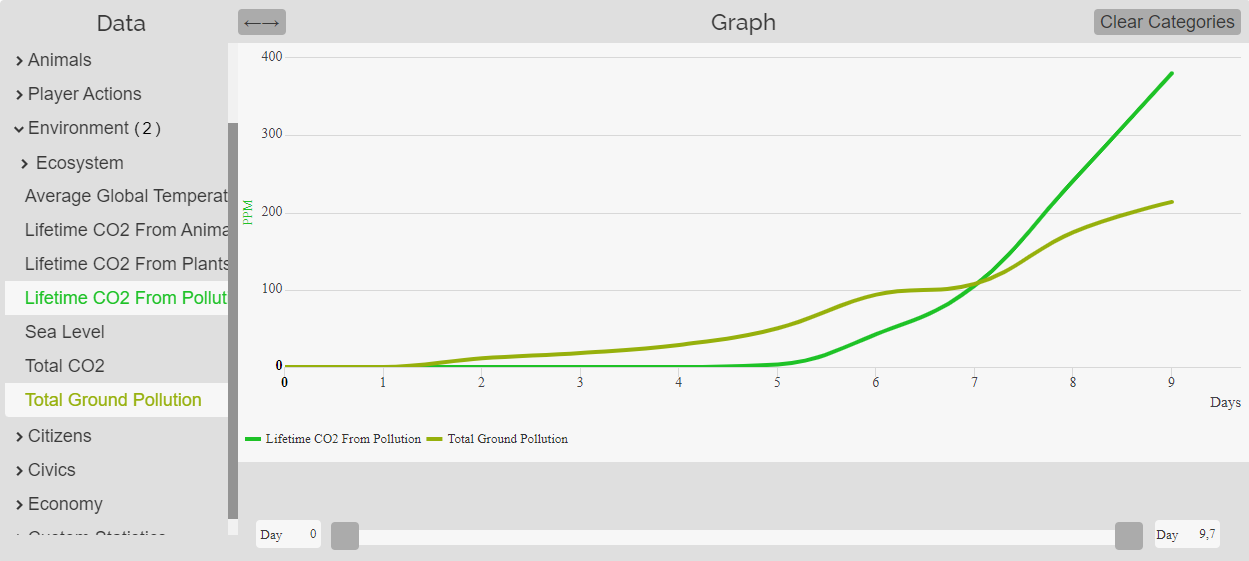
A graph in an Eco world showing the correlation between Citizen created pollution and CO2 in the atmosphere.
All games have systems of course, and their depth varies widely in terms of how much is simulated and exposed to the player. Plenty of games have shops where you can buy things for example, but fewer have a dynamic economy where those prices change based on supply and demand, and fewer still have the currency used for those transactions created by Citizens, taxed by a Citizen-made government, used to buy Citizen-created items. We have the capability to run simulations in games at far greater depths than most do, and the emergent effects would create far more interesting and complex worlds.
That depth has a massive impact on the value given to Citizens, because it asks more of them: It asks them to understand not just that they need ‘50 gold coins to buy a cart’, but instead to understand the functioning of economics and finance and commodities and supply and demand that led to that creation of the cart, and where they contribute to and benefit from that value chain. One might think that’s too much to ask, but the drive of players to achieve their goals in a game is a force to be reckoned with. Adding that kind of depth adds not only value to the Citizen, but also makes the game itself more fun.
In fact, I would go so far as to define fun primarily as ‘learning within a context that you care about’. Math might be a player’s least favorite subject in school, but in a game world Citizens will dive into the complexities of statistics and microeconomics to succeed in their goals.
This is the lesson I personally learned from the game ‘Civilization’. Whereas previously I hated history, seeing it as a collection of random dates and events to be memorized, Civilization gave me the gift of context. Through that game I could finally see clearly the depth at which history was connected, in rich overlapping systems; from the lowly worker to the emperor, all of it touching all of it. That context, a gift from a game, made history meaningful and fun, something I was part of, and I benefited much more from my education because of it.
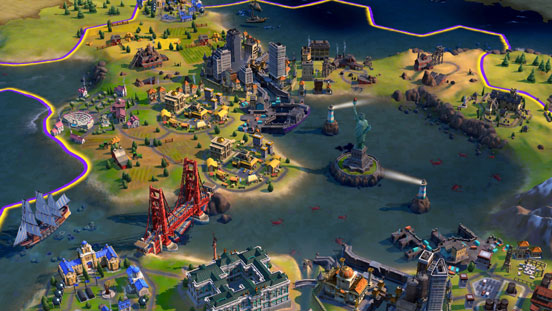
The
game Civilization immerses the player in emergent history, and was instrumental in making me
love history as a subject.
The Interplay of Many Systems
Designing these systems is easier than it might seem, because you get huge wins from their network effect. That is, when you add a new system (say, adding economics to an ecosystem simulation as in Eco) you instantly get a multiplying effect as that system affects and is affected by every other system. Adding an Nth system gives you N new interactions, with each other system that already exists. Contrast this to adding another piece of content: a level, an outfit, a skin. Instead of N new interactions, you get one.
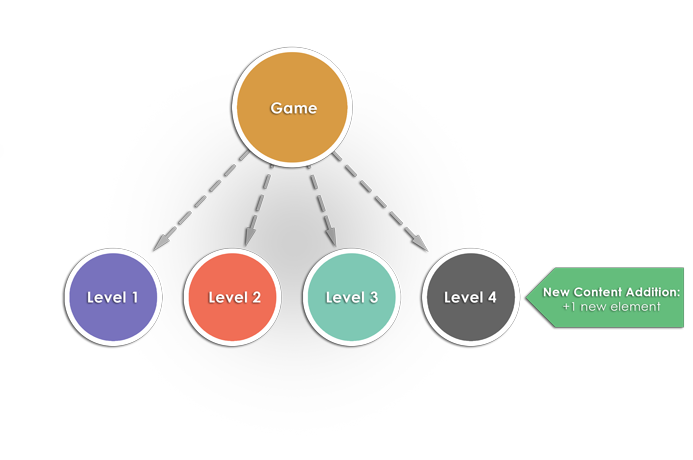
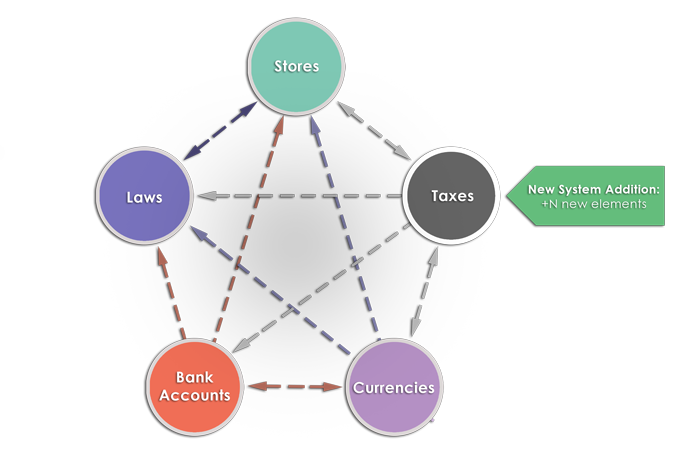
Diagram:
Network effect of adding new systems vs adding a new level
Additionally, it is in that system-of-systems where you get the most interesting emergent gameplay.
The results that emerge out of that represent real emergent systems, and all the complexity and
interesting effects that arise are a source of infinite gameplay. In Eco we see players experiencing
this through the economy simulation connected to government and ecosystem simulations. A review of
Eco in Venture Beat describes the effect well:
"Eco is a revelation...it made me realize that games are actually crucial for understanding our relationship to all kinds of natural and man-made systems. The thing that gives me chills is that I think it is only in games that we can play with economic systems. And I walked away from my experience in Eco feeling like I learned so much even though we had no instructor. No one was connecting the dots for us. We simply learned through play."
When you take a system-level approach to world creation, the need for the designer to create every experience of the player disappears, as those experiences will emerge naturally out of their interplay and be all the more valuable because of it. Those emergent mechanics are the visible result of interactions inside systems that are known to the player, that they can deduce from the inputs, and that represent effects that mirror reality. Citizens get to make that connection naturally as it emerges from the system, instead of it being spelled out by the designer. The experience and learning and achievement is thus theirs, it belongs to them, they earned it, and infinitely more meaningful because of it.
I learned the power of relationships in a game from my favorite game of all time, the early virtual world ‘Ultima Online’. Ultima was the first game I played that was a fully simulated world of real people, and the emergent effects of all of them interacting in a shared system was mind blowing. Years later I still remember relationships with people I had in that game, adventures we had and shared, and the kinds of real connections we developed. There was nothing virtual about it. By adding social interactions to a world and making them an integral part of its core systems, the game went from being a mere simulation to being something real.
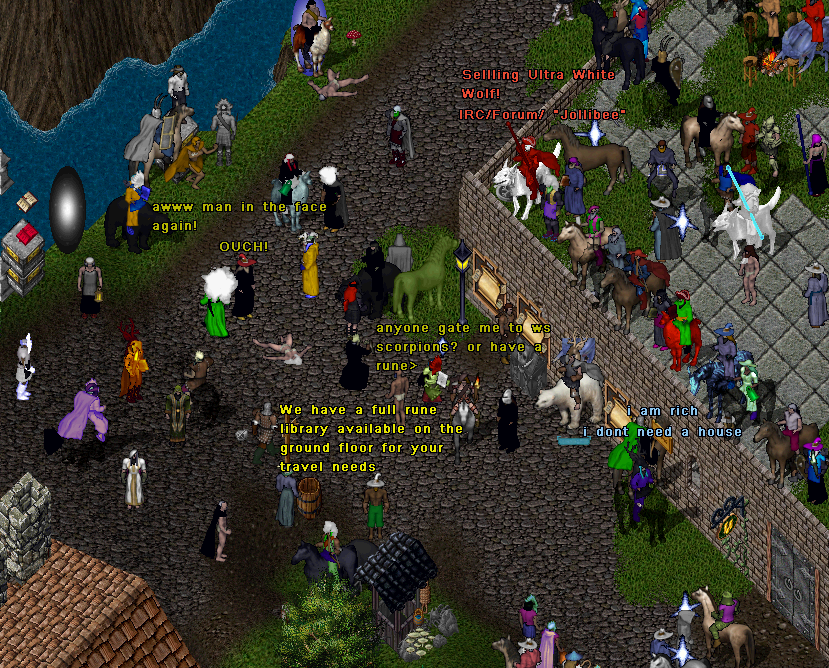
The social connections in Ultima Online made everything that happened in the world that much more meaningful and real. Relationships I had in that game I still think back on regularly as important life experiences.
When a game integrates deep relationships with others into the gameplay, not only does it require you to understand the psychology of decisions of other real players, but it connects you to them in real relationships. A relationship with another person is never artificial, even if the world where it happens is. Games that use such connections well can provide immense value to players.
Many multiplayer games limit the interactions you can have with players due to the potential for toxicity, and thus you can only interact through emotes, as distant enemies sniping at each other, or other shallow kinds of connections. Nevertheless, games like Journey were instrumental in showing that even within a limited channel like that, you can still form human connections that are profound.

The
game Journey showed the power of relationships in a game, even in a highly limited interaction
space.
I believe that we can widen those channels, creating much larger breadths of interaction that deepen
those connections, while designing them to route against toxicity, influencing the relationships to
be pro-social even in the face of conflict, and that the path to do that is through making
relationships a core mechanic of the game.
A wider set of mechanics
To achieve such deeper connections, gaming worlds need to vastly increase the types of relationships that are possible. In a shooter, there are generally just two types of relationships you might have: enemies and allies. Within those, there’s barely any room for granularity. You might have allies you are close with, or you might have enemies you particularly dislike, but in all the relationship-space is extremely shallow. It’s an unavoidable artifact due to the genre of game, and virtual worlds based on this kind of limited relationship will forever be limited in the depths of connection they can achieve among their players.
Contrast this with a virtual world that exists inside rich layers of systems. The relationships you
can have in such a world grow exponentially and emergently, as the role of players within these
systems varies. In an economic simulation between just two Citizens you can have many kinds of
relationships: customer and vendor, supplier and contractor, worker and boss, company owner and
financer, delivery-person and craftsmen. Within a government, you can have leaders and constituents,
protestors and corporate representatives, rival heads of state, campaign financers and government
regulators. Essentially, between any two people you encounter in such a world you’re going to have a
myriad of overlapping shared goals and conflicts and thus a unique context for a relationship. Your
relationship cannot be boiled down to a simple ‘ally’ or ‘enemy’, and more of the richness of human
interactions is captured within the game and given to its Citizens.
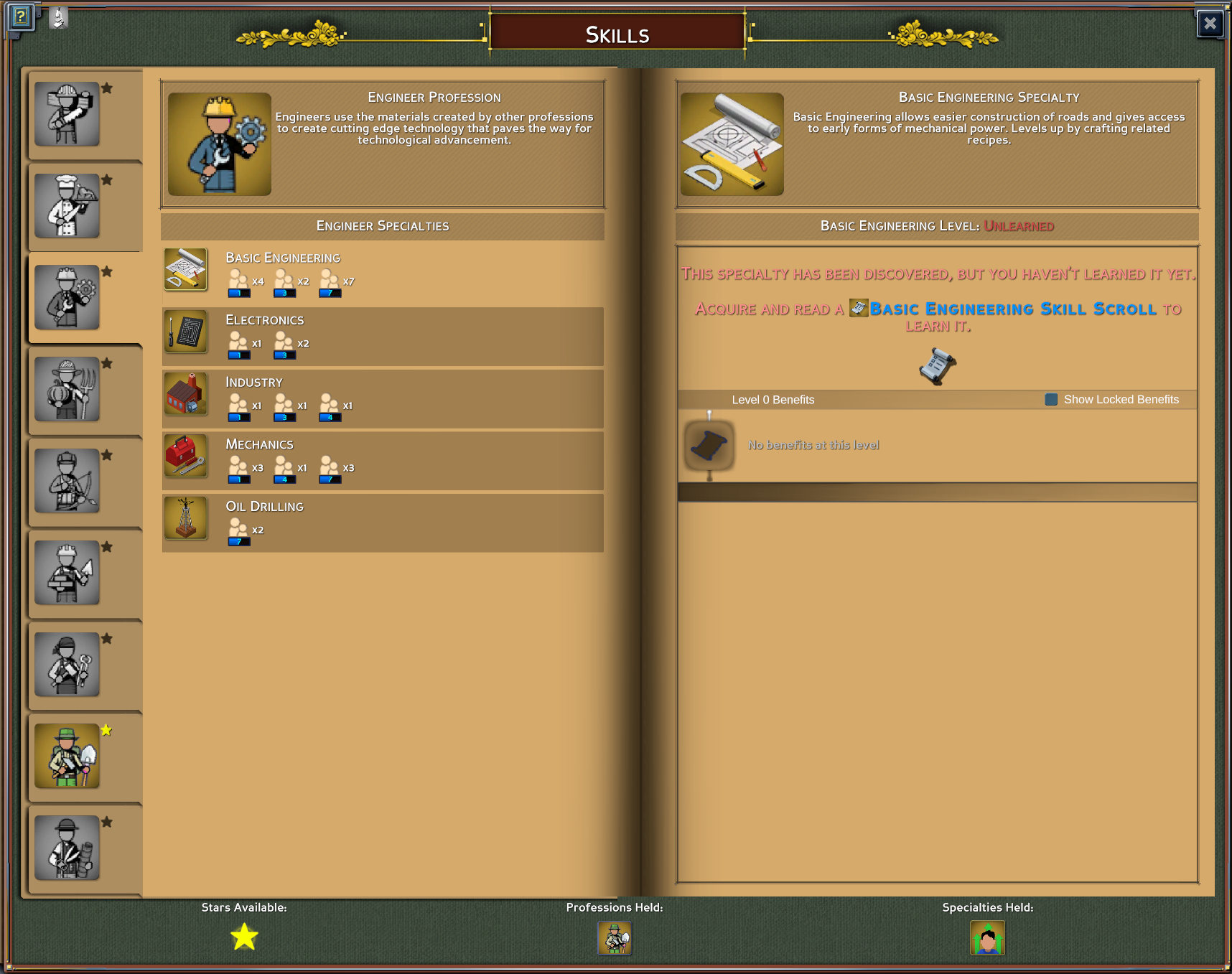
What’s more, navigating these social dynamics becomes critical to your success in the game, because
the mechanics of the world are so dependent on the actions of its occupants. Now you can use your
knowledge of the ecosystem to argue for a law that you think should be passed by your virtual
world’s congress – your knowledge and understanding of the world, that true
valuable-outside-the-game knowledge, is now also valuable socially, it pushes you forward in your
game goals, and yields deeper connections with others. Value is transferred to the players in this
way, amplified by social connection to achieve something qualitatively more meaningful.
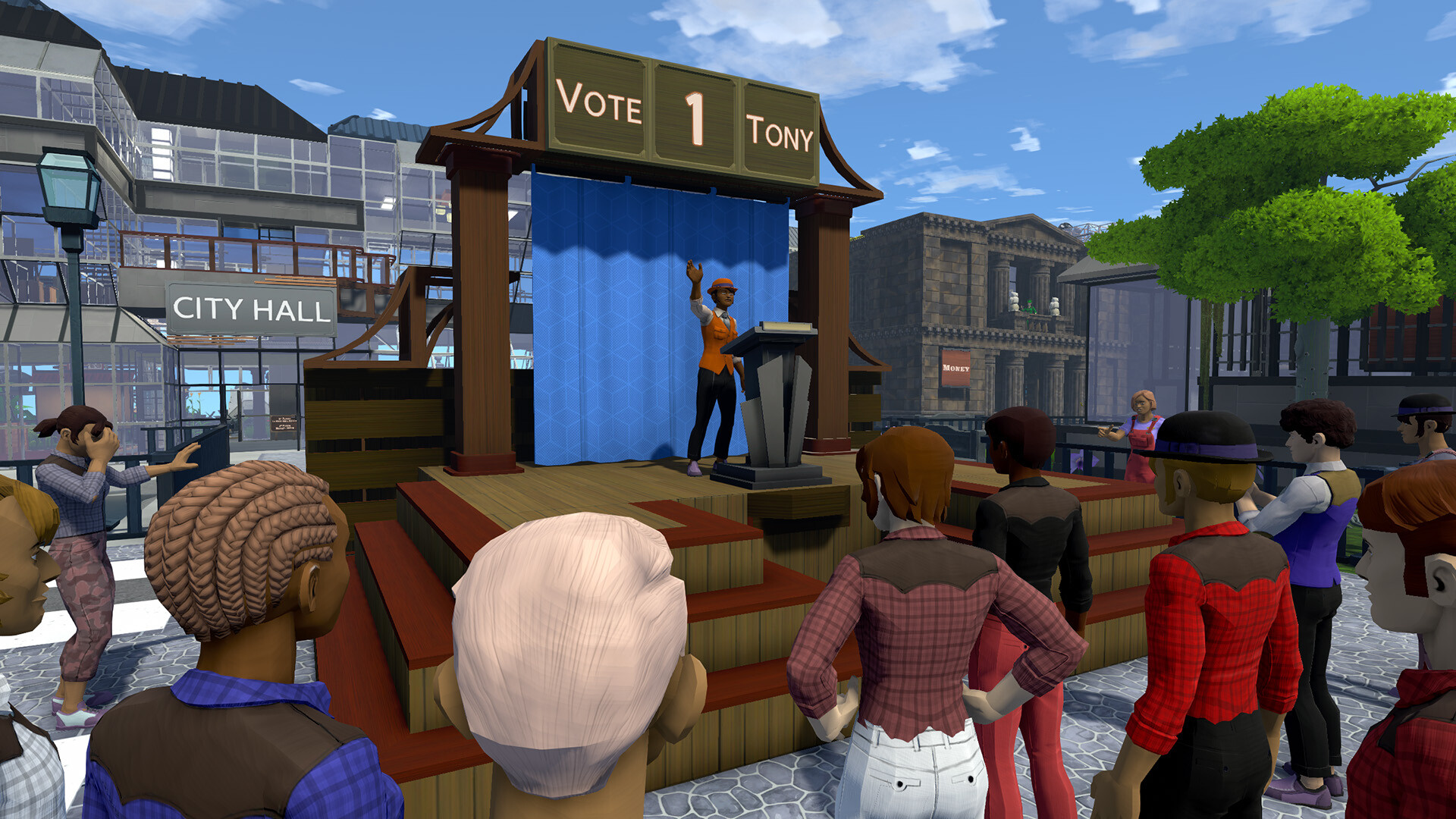
A
campaign rally in Eco where Citizens can be elected into government positions that afford them
special law-making powers.
Rich Identity
Within a world where players have this rich interaction space among each other, in-game identity becomes extremely important. In a shooting game I don’t care who the enemy down my sites is, their history and reputation are barely relevant, but in a richer interaction space the identity of others is immensely important. Is the person a leader in my society? What are their skills? Have they interacted with my friends in the game? Are they my neighbor? What are their achievements in the game? What do they care about? I can know a person in a deeper way, through their identity defined in a world of depth, and form a more meaningful relationship that way.
Their visual representation becomes much more important as well: I can watch their facial expressions animated via their webcam on their avatar as they give a campaign speech, I can see how they built and decorated their home, how they represent their avatar. A player’s history, background, reputation, achievements, and visuals will all meld together to present an in-game identity that is important and meaningful, not just window dressing, because social interactions are key to success in the game.
Insert image of new avatar facial animation + reputation windowbetween
them important and key to the experience. The deeper and richer the systems they play inside of are,
the richer their identities are going to be as they build up a history of interactions with those
systems, and the more meaningful those connections will be both in the game and in their own
right.
While many games pit players against one another to create a challenge in a game, not enough make the relationship between them important and key to the experience. The deeper and richer the systems they play inside of are, the richer their identities are going to be as they build up a history of interactions with those systems, and the more meaningful those connections will be both in the game and in their own right.
Human connection is intrinsically valuable, after all, and building a social landscape within a virtual world to allow that to happen with richness and depth and purpose presents incredible value to Citizens, not only through the game’s goals but through the sheer power of human connection.
Within such a virtual world of rich systems and pro-social connections, we can set a grand purpose that unites the Citizens. At the heart of the game can be a shared goal that affects everyone, and which everyone may contribute to in a unique way.
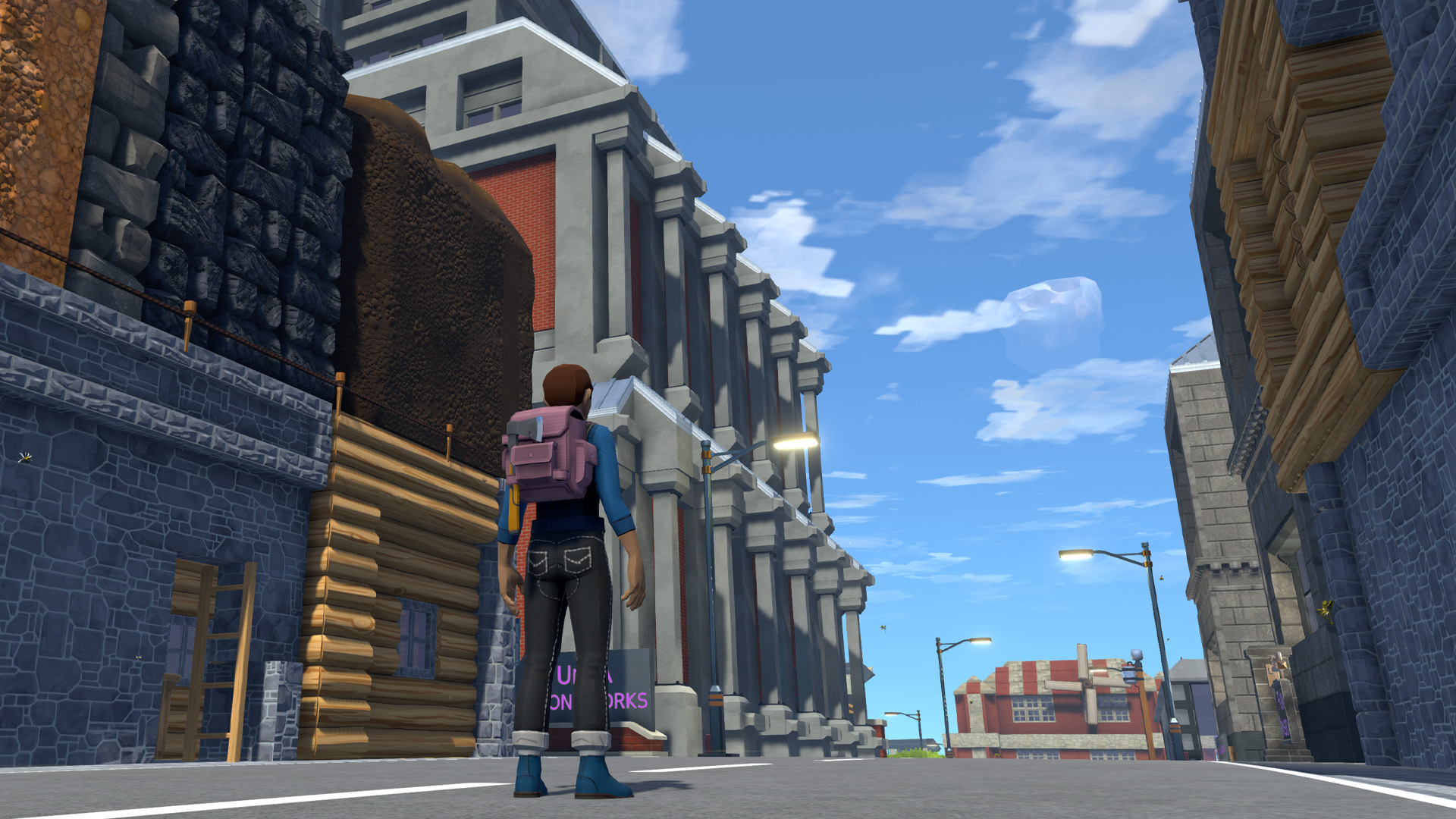
A
citizen contemplates the looming threat of a world-destroying meteor within a city built from
scratch by their community.
In Eco, we’ve set a global goal of stopping a meteor from destroying the planet, requiring you to develop sufficient technology to do so, but with the added risk of destroying the ecosystem from pollution in the process. It’s a complicated task made all the more complex because it requires the collaborative effort of dozens of players, each with their own established identities, values, biases, and desires in game that must be navigated, debated, and unified.
Tragedy of the Commons, The Game
The really interesting part of this is that even in a world of shared goals, people will have conflicting ideas about how to progress, and those conflicts may even threaten to derail the whole project. This overlap between competition within a wider goal of cooperation creates a complexity of gameplay that has tremendous emergent value.
Having an imperative goal to unite the player base, even while requiring players to forge their own path to contribute to the whole, creates a sense of camaraderie and connection that mingles with conflict in a very complex way. ‘We’re in this together, but my way is better’. It’s ‘Tragedy of the Commons’, the game: each player acting according to their own needs will destroy the shared goal, but through intelligent organizing that inevitability can be avoided. Layering this on top of the real-world simulations of the game, and the social interactions that happen within it, and you have a recipe for fantastic depth and meaning.
A Niche for Every Citizen
Having a grand societal project like that as a goal for a player-base requires many different types of contributions, and players will have to differentiate and find their niche in order to succeed. Those
differences will further fuel the types of relationships you need in the game, because each player is approaching the problem from a different angle, and can find trades and connections among different players with different specialties. No individual player can complete everything alone, and pro-social connections are necessary for success in the game world.
Because Citizens need one another for their game goals, you get a natural force that pushes forward positive interactions: I need to buy what you sell, I need to get paid to perform this labor you requested, you need my vote, we share the same environment. Having deeper, more varied relationships will add to your game experience, which results in value for players beyond pure entertainment. It’s not enough to be powerful in a game, you must be capable of empowering others. Soft-skills, too often missing from games, become a primary factor of success.
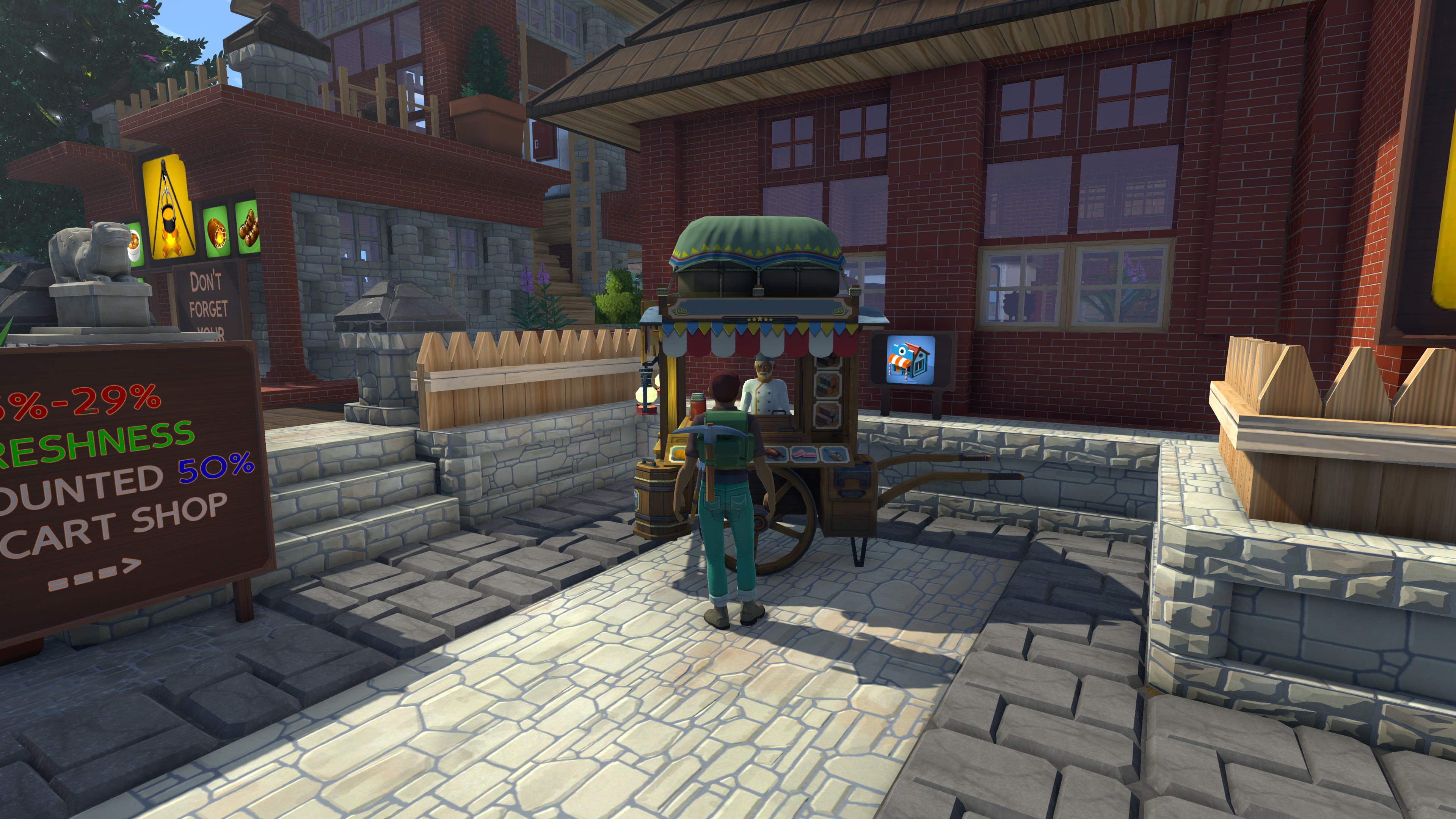
Citizens
trading the products of their specialized professions at a mobile shop.
What’s more, because Citizens need one another there is a tremendous ‘welcoming’ effect, as new players will help existing players achieve their goals in a symbiotic trade, and so they’re welcomed into the experience, mentored and supported by an open community. This social gameplay makes new-Citizen arrival add further value to the existing community. It’s a recipe for growth that is valuable for all parties.
Citizen Alignment
Having a shared global challenge doesn’t erase toxicity, but it creates a natural force that guides players into positive interactions, even among competitors. We have found in Eco worlds that the majority of players interact positively, collaborating in the economy even as they compete. With the added effect of a rich history and reputation being visible for all Citizens in the game, toxicity is made all the more punishing to your goals because it naturally undermines your ability to succeed. When toxicity does occur, the tools of the government can be used to overcome it and stop it from affecting the group – in fact, it can be rendered into a positive for gameplay: a villain to be defeated using the tools of society. Having a rich identity in the game contributes as well, toxicity grows most easily in anonymous or passing interactions, and shrinks in the face of rich identities and long-term connections.
Over time we see positive and supportive communities emerge that are nonetheless engaging in passionate debate and disagreement, while working to bridge those gaps. They’re both conflicted and connected by this shared global project. It’s a beautiful thing.
When such a world is run on emergent systems, an inescapable result is that failure becomes an option, a possibility that counterintuitively adds to the experience. If a world can die from economic collapse, or a meteor striking it, completely erasing everything you’ve labored on for weeks or months or years, there are massive stakes added to everything you do. Your choices matter. And for once in a game you can literally save the world, because it can truly be destroyed.
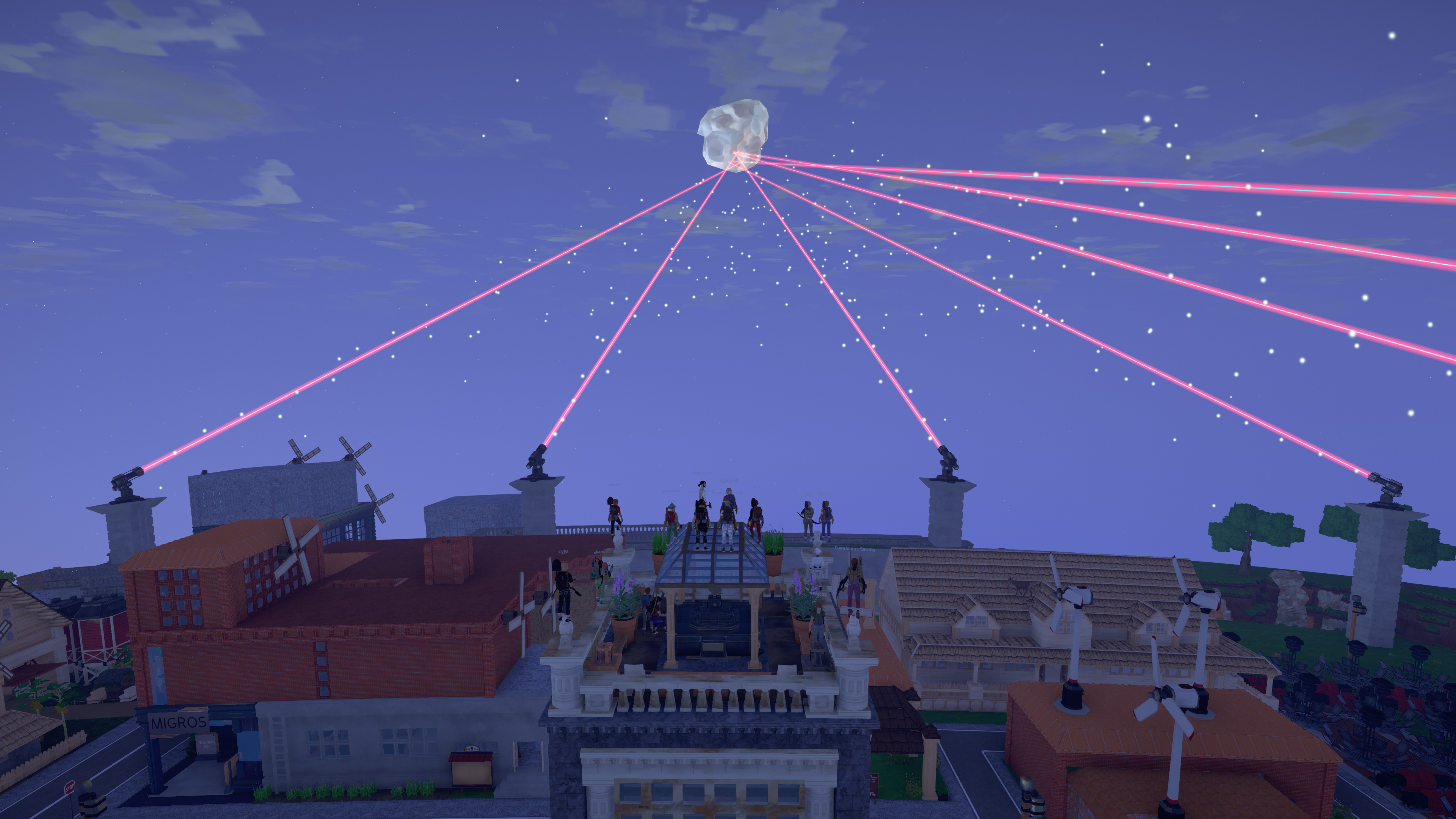
Citizens
completing a society-level goal of preventing world destruction, watching in the final
moments as the meteor is destroyed.
This idea, that what you do matters in a big way to a world in which you invested heavily, goes against a common direction I see in games, especially virtual worlds: the idea that you should be able ‘to do anything!’, that limits in games should be removed, that freeing you up to do what your heart desires without consequence is the role of games. That misses a massive opportunity of games.
Without consequences you have little meaning or depth, and the feeling that nothing really matters because it has no lasting impact. When you go fight a boss to save the world in an online RPG and it immediately respawns for the next raid group to fight, the experience is rendered deeply artificial. It is not yours. You were only playing at saving the world, there was never really any threat, it was all pretend, and your actions were thus much less meaningful.
Instead, you can have real threats in a virtual world. When the social connections you have in a virtual world are real, things that affect those social connections are also real. Losing in a world, especially at a global scale where the world literally ends, is
Why subject players to this? Because without stakes, meaning is lost. This is felt in the theme-park style games where the missions you take on are respawned, canned quests for people to continuously perform. They have no meaning, no context, and feel like a waste of time. In MMO games like this, it’s the connection among players that yields the true value. A better virtual world would give you quests that are more connected to the reality of the world, to the social connections you’ve made, direct results emerging from the world’s systems. It would let you have a true shared sense of triumph or tragedy with your fellow Citizens. It makes every action leading up to that result meaningful and important, because there is something at stake.
.jpg)
An
Eco world that was not so successful stopping the meteor.
Stakes like this are a powerful force in a game,
but they do dictate what kind of game they can exist in: it only works in games where there are
many virtual worlds, as some will be destroyed, but the game must continue for others. In Eco
there are thousands of hosted player servers, some that are destroyed by the meteor, some that
succumb to ecosystem collapse, and some that triumph and save the world that they all built
together. Because there are many worlds, some can perish without jeopardizing the entire
business venture of building a game. Having many worlds like this is also a key strategy to the
vision of ‘User Generated Societies’, an idea I’ll explore in the next article.
With a virtual world focused on these core principles of deep simulations, real relationships, global challenges, and global consequences, the stage can be set to build something really meaningful and valuable to a great number of people’s lives, something that is not an escape from reality, but rather the opposite of it: an engagement with their life, others, and the world.
The next step is to take these emergent worlds and expand them into growing and lasting communities, connect them together, and share the value that is being created in them among all the participants; developers and players alike.
In the next article I’ll explore how User-Generated Content can be expanded into User-Generated Societies, building hierarchical structured communities that are composed of richly defined relationships and rules and maintained by the Citizens with true ownership.
This is the second article in a three-part series
describing the vision of what we're building at Strange Loop Games.
Click
here for Part I: Players as
Citizens.
Click
here for Part III: User
Generated Societies.
Email: [email protected], Twitter @jkrajewski